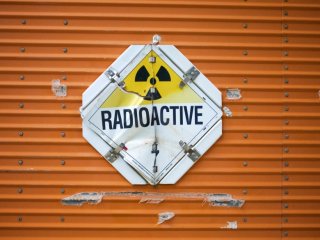Turkey’s Nuclear Reactor: A Tempting Target?
Accurate missiles and drones could knock down critical electrical supply lines to Turkey’s nuclear reactor and destroy its emergency generators, nuclear control rooms, reactor containment buildings, and spent reactor fuel buildings.
Although it got little attention from the U.S. media, an explosion late last month at a Turkish nuclear power plant construction site raised eyebrows in Turkey. It should raise eyebrows in America, too. Donald Trump pushed nuclear exports to the region when he was president. His replacement, Joe Biden, should not. The recent Turkish explosion clarifies why: nuclear plants in unstable regions are tempting targets that could explode, and not by accident.
The blast injured at least two people and caused serious damage to homes in the area. The Russian-Turkish nuclear construction firm, Akkuyu Nuclear Inc., claims the explosion took place when a subcontractor carried out “planned drilling and blasting.” So far, Ankara has kept mum on the story.
Angry local officials and opposition party leaders, though, aren’t buying the construction firm’s account. A member of the leading political opposition, the Republican People’s Party, said locals are losing sleep “thinking about the possibility of more blasts that might happen in the future when the nuclear power plant starts to function.” Meanwhile, the local governor has ordered a special police team to investigate the incident and to “hold those responsible to account.”
Whether or not the explosion was planned, the Republican People’s Party leaders, Turkish citizens, and local Akkuyu politicians worry about reactor accidents. The Akkuyu plant sits on a major plate tectonic fault line. Besides natural accidents, they should worry about another threat—terrorist and proxy missile and drone attacks. Certainly, if government officials ignore local opposition to the nuclear project, then they will have to worry that the PKK (a Kurdish terrorist group that seeks an autonomous state in southeastern Turkey) might hold the Turkish government hostage by threatening to strike the plant.
Nearby, last July, the Azerbaijani defense ministry’s spokesman did precisely that, publicly threatening to use precise Azeri missiles to strike Armenia’s Metsamor nuclear power plant. It was shortly after this threat was made that Russian president Vladimir Putin called Turkish president Recep Erdogan to restrain Azerbaijan’s military. The Iranians and their proxies also have toyed with attacking reactors. Hezbollah, armed with Iranian-made rockets, has threatened to strike Israel’s Dimona nuclear reactor.
Another Iranian proxy, the al-Houthi group in Yemen, claimed that they fired a missile at the UAE’s Barakah nuclear power plant, which it failed to hit. They claim they intend to try again.
Finally, if Iran chose to give similar missiles to militias such as the Syrian National Defense Forces, who are supportive of the Assad regime in Syria (a bitter enemy of Turkey), similar threats might be made against Akkuyu.
Then, there is the PKK, which has attacked Turkish soldiers and military bases with sophisticated explosive drones. In one attack, the PKK blew up a Turkish ammunition dump, killing seven Turkish soldiers and wounding dozens more. Security analysts contend the PKK’s newer drones can travel sixty miles at fast enough speeds to outwit Turkish military jamming technology. They are now reportedly designing a new generation. Such drones have to be considered a future threat against Turkey’s nuclear plant.
They already are in the United States. The Federal Aviation Administration is now studying how drones might harm power plants including nuclear reactors. Why? Between 2015 and 2019, at least fifty-seven drones flew illegally over United States nuclear power plants, including swarms that flew over plants in Arizona and Pennsylvania.
The Turks should pay attention. Accurate missiles and drones could knock down critical electrical supply lines to a reactor and could destroy its emergency generators, nuclear control rooms, reactor containment buildings, and spent reactor fuel buildings. The effect of such strikes range (in the case of calculated near misses) from inducing public panic (and the consequential shutdown of reactors throughout the country) to inducing spent fuel fires that could release massive amounts of radiation, mimicking Chernobyl or worse.
All of this suggests Akkuyu is a nuclear target in the making. Turkish critics of the Akkuyu project, including the Republican People’s Party, argue it would be far cheaper and safer to kill the reactor and invest instead in renewables and natural gas. The Biden administration should be on their side and quietly encourage Turkey to drop the project. Helping it with nonnuclear alternatives would make sense.
Henry Sokolski is the executive director of the Nonproliferation Policy Education Center and the author of Underestimated: Our Not So Peaceful Nuclear Future. He served as deputy for nonproliferation policy in the office of the U.S. secretary of defense from 1989 to 1993.
John Spacapan is the Wohlstetter Public Affairs Fellow at the Nonproliferation Policy Education Center and is researching the future of security arrangements in the Middle East.
Image: Reuters

